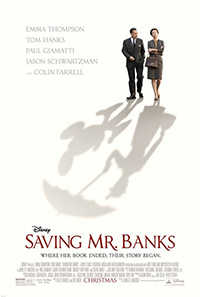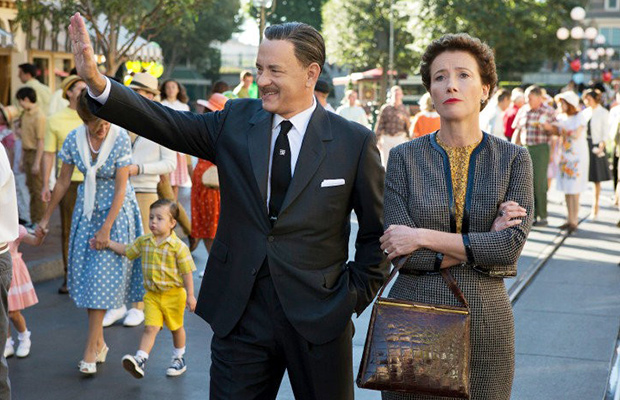Reviews
Saving Mr. Banks | Review
Sugartime: Hancock Syrupy Recount Gets the Disney Dress Up
 There’s a fascinating story lurking somewhere in John Lee Hancock’s Saving Mr. Banks, but it’s relegated to the shadows, perhaps evident only in fleeting moments of Emma Thompson’s attention worthy performance of Mary Poppins author P.L. Travers, one of those delightfully bitter caustic types that people shudder to socialize with yet love enjoying on cinema screens. Not unlike the adolescent triteness with which racial issues are depicted in his 2009 film The Blind Side (showered with such an overabundance of awards and praise that its reception would make a great parody years from now), Hancock successfully Disneyfies Travers,’ a feat that surely would have her rolling in her grave. The very conflict that buoys Hancock’s film about the creative struggle between Walt Disney and Travers to bring Poppins to the silver screen can only reiterate its own agenda, and, for now, serves as the last laugh in Travers’ struggle to maintain authorial control over her creation.
There’s a fascinating story lurking somewhere in John Lee Hancock’s Saving Mr. Banks, but it’s relegated to the shadows, perhaps evident only in fleeting moments of Emma Thompson’s attention worthy performance of Mary Poppins author P.L. Travers, one of those delightfully bitter caustic types that people shudder to socialize with yet love enjoying on cinema screens. Not unlike the adolescent triteness with which racial issues are depicted in his 2009 film The Blind Side (showered with such an overabundance of awards and praise that its reception would make a great parody years from now), Hancock successfully Disneyfies Travers,’ a feat that surely would have her rolling in her grave. The very conflict that buoys Hancock’s film about the creative struggle between Walt Disney and Travers to bring Poppins to the silver screen can only reiterate its own agenda, and, for now, serves as the last laugh in Travers’ struggle to maintain authorial control over her creation.
Beginning in 1961, when author P.L. Travers’ (Emma Thompson) royalties for her famed Mary Poppins books have begun to dry up (and with no new material forthcoming), she reluctantly must travel from London to Los Angeles to consider granting Walt Disney (Tom Hanks) the rights to make a film version. She’s been offered unprecedented final script approval, but is convinced that Disney will butcher her regal governess by turning her into more of the sugary schmaltz released under Disney’s good name.
With two weeks to prove their meritorious intent to make Mary Poppins into a fantastic musical (something Travers loathes as much as she does animation), she sets down to work with co-writer Don DaGradi (Bradley Whitford) and composers Robert and Richard Sherman (B.J. Novak and Jason Schwartzman). Just as it seems like all is lost with her incessant negativity and unreasonable demands (she doesn’t want there to be any of the color red in the film), her own suppressed memories of her childhood in Australia, where her alcoholic father (Colin Farrell) died of influenza, begin to resurface, softening her into considering she may indeed find some common ground with the men trying to adapt her work.
Realistically, the only way we’re going to get to see an authentic composite of Walt Disney is if it were to be financed by a studio not bearing his very name. Hanks’ very limited performance is comically superficial; one would think the man did no wrong. Sure, he’s got his bag of tricks with which he manipulates Mrs. Travers, but he’s certainly portrayed as the more rationale, understandable element. But, as Disney tends to brush discomforts out of sight and under the carpet, we’re forced to witness this declawed sparring of wills, which ends in a crescendo of emotional ejaculation, not bothering to discuss that the real Travers was so disgusted with the end product from Disney that she would never again allow him a chance to film her work, and would even stipulate certain conditions about its future in her last will and testament.
Speaking of the real Travers, there is a doozy of a story there, a veritable landmine of problematic details that Hancock doesn’t touch with a ten foot pole. Her speculative romantic life, rumored bisexuality, and adopting one of a set of twins based on advice from an astrologer are all noteworthy details, but this is certainly not the film in which they will be discussed. Instead, Hancock and screenwriters Kelly Marcel and Sue Smith bifurcate the narrative into Travers’ 1961 trip to Walt Disney studios and childhood flashbacks in Australia which inspired her to eventually create the Poppins character. These flashbacks are, at first, jarring, until we grudgingly accept their frequent occurrence, though an attempt to seamlessly blend past and present is curiously effective in one sole instance. In essence, Thompson is quite boxed in here, left to rely on conveying Travers solely as a lonely, bitter spinster. As per usual, it’s a perfectly calibrated performance from Thompson, right down to every facial tic and tear, but removing all those unsanitary human elements that define Travers as more than a jaded harpy makes this a frustratingly neutered affair.
Likewise, supporting cast members like Jason Schwartzman and the always enjoyable Kathy Baker are confectionary details, each with a slight moment or two, while limo driving Paul Giamatti gets saddled with several forced moments as Travers’ only developing friendship.
Having any foreknowledge of Travers, or perhaps the murky reputation (however evidently unfounded), of Walt Disney, means that Saving Mr. Banks becomes a rather frustrating experience, lapsing into convenience and the schmaltz Travers so abhorred herself. Perhaps the rights remain unavailable for more Mary Poppins vehicles, but it certainly seems Travers would equally hate being represented as a hypocrite, no matter how accomplished the wonderful actress is playing her.
As an origin story for her most famous work, it instead drains it of magical potency, to be replaced by sanitized and mundane familial dramas that aren’t capable of realistically addressing the ramifications of alcoholism. It’s an odd song and dance in that the behind-the-scenes squabbles behind Mary Poppins are fascinating, but the reluctance in their rendering makes the film bland and disappointing, an example of an inability to maturely deal with the very adult details in the lives of adults responsible for the output of family friendly entertainment.
2/5 Stars
Los Angeles based Nicholas Bell is IONCINEMA.com's Chief Film Critic and covers film festivals such as Sundance, Berlin, Cannes and TIFF. He is part of the critic groups on Rotten Tomatoes, The Los Angeles Film Critics Association (LAFCA), the Online Film Critics Society (OFCS) and GALECA. His top 3 for 2021: France (Bruno Dumont), Passing (Rebecca Hall) and Nightmare Alley (Guillermo Del Toro). He was a jury member at the 2019 Cleveland International Film Festival.
































